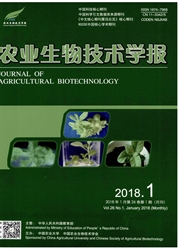

 中文摘要:
中文摘要:
从第19期(孵化68-72h)鸡(Gallus domesticus)胚生殖嵴分离原始生殖细胞(PGC),通过PGC-体细胞共培养进行了原代和传代培养,并对PGC做了c-kit免疫组化鉴定。通过改变PGC的体外培养条件:添加或不加胎牛血清(FCS),使用或不使用颗粒细胞饲养层,以诱导PGC的分化,同时分别用神经元烯醇化酶(NSE)和角蛋(keratin)免疫细胞化学法鉴定分化的细胞。结果表明培养的鸡胚PGC在无饲养层、添加5%FCS且不更换培养液的条件下培养5~6d后可分化为成纤维细胞和神经样细胞;PGC在饲养层上、不添加FCS且不更换培养液的条件下培养5~6d后可分化成上皮样细胞、骨骼肌样细胞和神经样细胞。结果证明,从鸡胚生殖嵴分离的PGC具有多向分化的潜能。
 英文摘要:
英文摘要:
Primordial germ cells (PGCs) were isolated from the genital ridges of chicken (Gallus domesticus) embryos at the 19th stage. PGCs were co-cultured with somatic cells in primary culture and subculture. Identification of PGCs was carried out by c-kit immunocytochemistry. PGCs were induced to differentiate by changing the culture conditions: medium with/without fetal calf sennn (FCS) and with/without the granulosa cell feeder layer. The differentiated cells were identified by neuron specific enolase (NSE) and keratin immunocytochemical staining. Results showed that after 5-6 days culture in medium supplemented with 5% FCS and without feeder layer the cultured PGCs could differentiate into fibroblast and neuronal cells. Meanwhile, after 5-6 days culture in serum-free medium with feeder layer the PGCs could differentiate into epithelial and skeletal myoblast cells, as well as neuronal cells. The above results demonstrate that the PGCs isolated from chicken genital ridges possess pluripotent of differentiation.
 同期刊论文项目
同期刊论文项目
 同项目期刊论文
同项目期刊论文
 期刊信息
期刊信息
